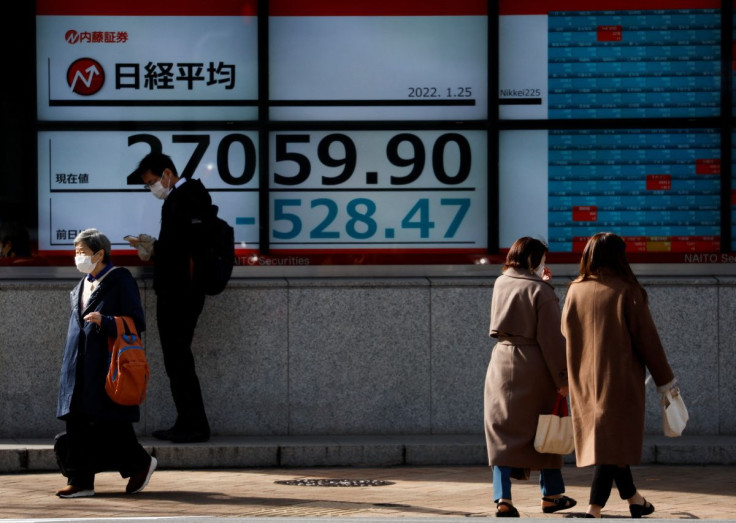Wall Street Wavers; U.S. 10-year Yield Steadies Near 2%

Wall Street oscillated in morning trading on Friday, backing down from early gains, and benchmark Treasury yields hovered around 2% as market participants grappled with decades-high inflation and the prospect of a tightened rate hike timeline from the U.S. Federal Reserve.
The major indexes were last slightly higher, with oil prices helping energy shares see the largest percentage gains.
The S&P 500, the Nasdaq and the Dow were all on track to notch weekly gains.
On Thursday, a report from the Labor Department showed U.S. inflation at its hottest level in four decades, fueling concerns that the Fed could begin hiking key interest rates more aggressively than many anticipated.
Those concerns were heightened after St. Louis Federal Reserve President James Bullard told Bloomberg he wants a full percentage point of interest rate hikes over the next three central bank policy meetings.
Financial markets are fully pricing in a rate hike of at least 25 basis points from the Fed at its March 15-16 policy meeting and are forecasting a 71.5% chance of a 50-basis-point hike, according to CME Group's FedWatch Tool.
"We really won't know what the Fed is going to do until it happens," said Tim Ghriskey, senior portfolio strategist at Ingalls & Snyder in New York. "There's a lot more data between now and the next Fed meeting for them to access."
"There's little chance the Fed will not act, but I continue to believe we'll see signs of moderating inflation between now and the Fed meeting and a 25 basis point hike is the more likely move," Ghriskey added.
The Dow Jones Industrial Average rose 105.6 points, or 0.3%, to 35,347.19, the S&P 500 gained 3.02 points, or 0.07%, to 4,507.1 and the Nasdaq Composite dropped 16.92 points, or 0.12%, to 14,168.72.
Interest rate sensitive tech shares weighed on European stocks as high U.S. inflation raised the odds of a more aggressive Fed.
The pan-European STOXX 600 index lost 0.44% and MSCI's gauge of stocks across the globe shed 0.21%.
Emerging market stocks lost 0.64%. MSCI's broadest index of Asia-Pacific shares outside Japan closed 0.73% lower, while Japan's Nikkei rose 0.42%.
U.S. Treasury yields eased on Friday, as markets assessed a sharp move higher the previous day driven by inflation and Bullard's commentary.
Benchmark 10-year notes last rose 2/32 in price to yield 2.0224%, from 2.029% late on Thursday.
The 30-year bond last fell 12/32 in price to yield 2.3197%, from 2.302% late on Thursday.
The dollar was little changed against a basket of world currencies but was on course for weekly gains following the CPI data and worries over aggressive Fed tightening.
But the euro weakened following a warning from European Central Bank President Christine Lagarde that raising interest rates would only hurt the economy.
The dollar index rose 0.16%, with the euro down 0.27% to $1.1396.
The Japanese yen strengthened 0.14% versus the greenback at 115.88 per dollar, while Sterling was last trading at $1.3594, up 0.29% on the day.
Crude prices advanced after the International Energy Agency (IEA) said oil markets were tight, exacerbating supply concerns as Russian massed more troops along the Ukrainian border and diplomats scrambled to avoid an invasion.
Gains were capped on the resumption of indirect talks of reviving a nuclear deal between the United States and Iran, raising hopes that lifting sanctions on Iranian oil could ease supply worries.
U.S. crude rose 1.86% to $91.55 per barrel and Brent was last at $92.74, up 1.45% on the day.
Gold prices inched higher, hovering near the previous session's two-week peak.
Spot gold added 0.5% to $1,835.50 an ounce.
© Copyright Thomson Reuters 2024. All rights reserved.




















